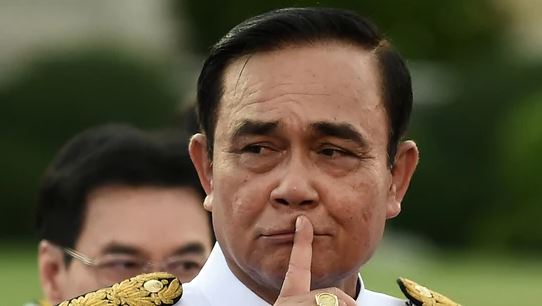After resolving to consider a petition seeking revision of the constitutionally required eight-year term limit for the Prime Minister of Thailand, the Constitutional Court of Thailand decided on Wednesday to suspend Prime Minister Prayuth Chan-ocha from his official responsibilities.
The petition that was submitted by the primary opposition party argued that Prayuth’s time spent as head of a military junta after he staged a coup while he was army chief in 2014 should count towards his constitutionally mandated eight-year term as prime minister. This petition was submitted by the main opposition party.
The unexpected suspension of Prayuth has thrown Thai politics into disarray, despite the fact that the court may decide to reinstate him to his post after rendering its verdict.
The court informed the media in a statement that Prayuth has 15 days to answer to the allegations against him, and that a panel of justices voted five to four in favour of his suspension, which will begin on Wednesday.
According to comments made to the media on Monday by another deputy prime minister, Wissanu Krea-ngam, it is anticipated that Prawit Wongsuwan would take over as the head of the interim government.
After overthrowing a government that had been elected by the people in 2014, Prayuth governed as the leader of a military council.
Following an election that took place in 2019 under a constitution that was created by the military in 2017 and imposed an eight-year limit for the prime minister’s term, he was elevated to the position of civilian prime minister.
Anucha Burapachaisri, a spokeswoman for the government, said that Prayuth respects the court’s judgement and has quit active duty. Burapachaisri added that the suspension will not have any effect on the job that the government does.
The primary opposition party has stated in its request for a review that Prayuth should step down from his role as prime minister at the end of this month because his time spent serving as head of the junta should count against his term.
According to the results of a recent survey, over two thirds of Thai citizens want Prayuth to step down from his position as prime minister by the end of this month.
However, some of his supporters claim that his tenure began in 2017, when the new constitution took effect, or after the election in 2019, which means that he should be able to remain in power until 2025 or 2027, depending on whether or not he is elected.
The conflict is the most recent instance of political unrest in a nation that has endured sporadic political upheaval for almost twenty years, including two coups d’état and violent demonstrations. The unrest is largely the result of opposition to the involvement of the military in politics and demands for greater representation as political awareness increases.
Activists for democracy have been running campaigns against Prayuth and his administration, alleging that the election in 2019 did not have the legitimacy it should have.
However, as a result of COVID-19’s prohibitions on gatherings, student-led protests have been far less frequent over the previous several years. However, campaigners have gotten together once again this week in preparation for the court’s judgement.
Nearly one hundred people demonstrating in support of democracy at Bangkok’s central Democracy Monument praised Prayuth’s suspension but said that it was insufficient.
